Leadership Analysis: Abraham Lincoln and Transformational Leadership
VerifiedAdded on 2023/01/18
|8
|2280
|25
Essay
AI Summary
This essay presents a thematic literature review focusing on the leadership qualities of Abraham Lincoln, exploring his transformational leadership style. The analysis delves into Lincoln's ability to handle both success and failure, highlighting his emotional intelligence, resilience, and disciplined approach to life. The essay examines his engagement with team members, his ability to communicate goals, and his vision for the nation, especially during the American Civil War. The paper discusses how Lincoln's leadership aligns with transformational leadership theory, emphasizing his ability to inspire and include others in the decision-making process. It explores his personal and professional experiences that shaped his leadership, including his ability to build a cabinet of rivals and his empathetic approach to leadership. The essay uses various sources to support the analysis of Lincoln's leadership and its lasting impact on world politics.
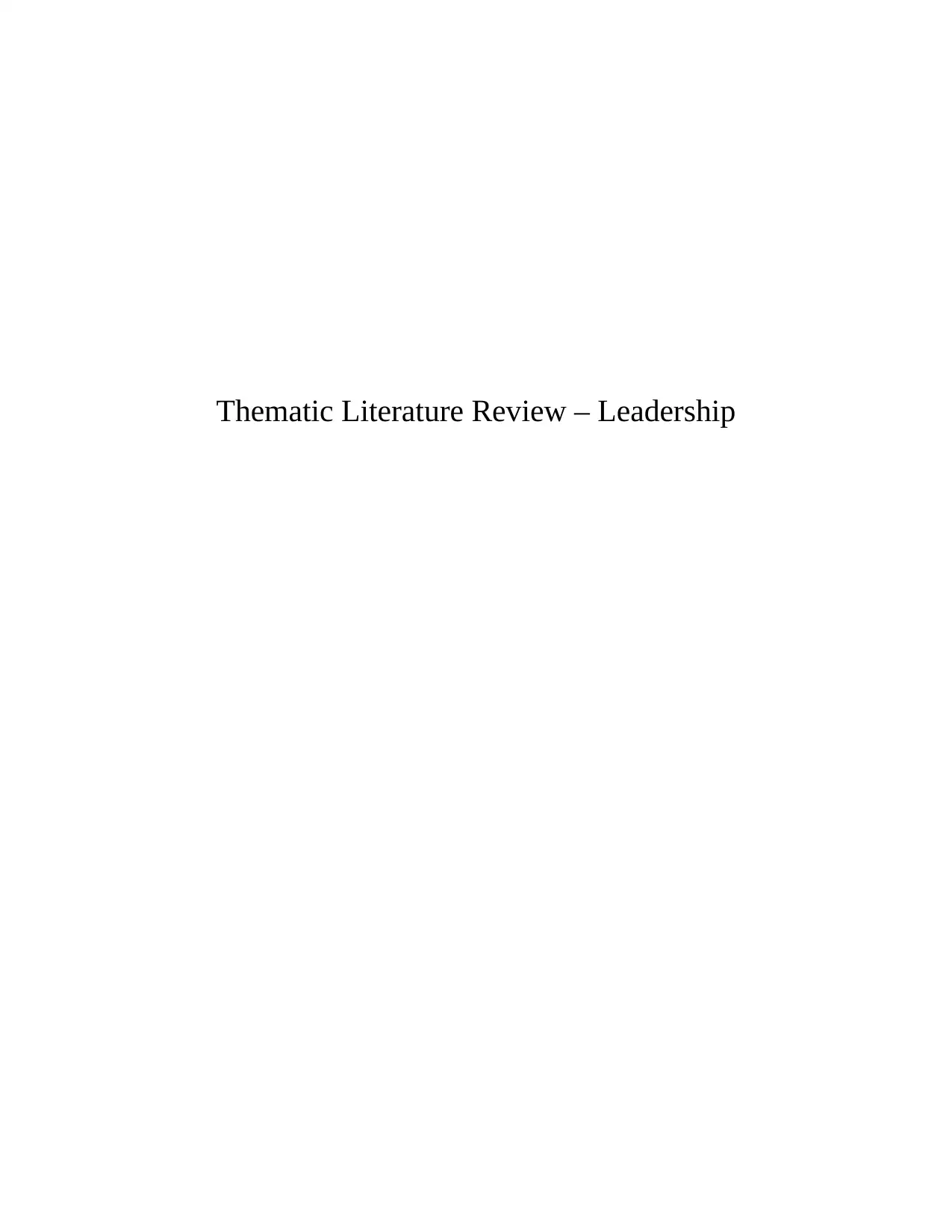
Thematic Literature Review – Leadership
Paraphrase This Document
Need a fresh take? Get an instant paraphrase of this document with our AI Paraphraser
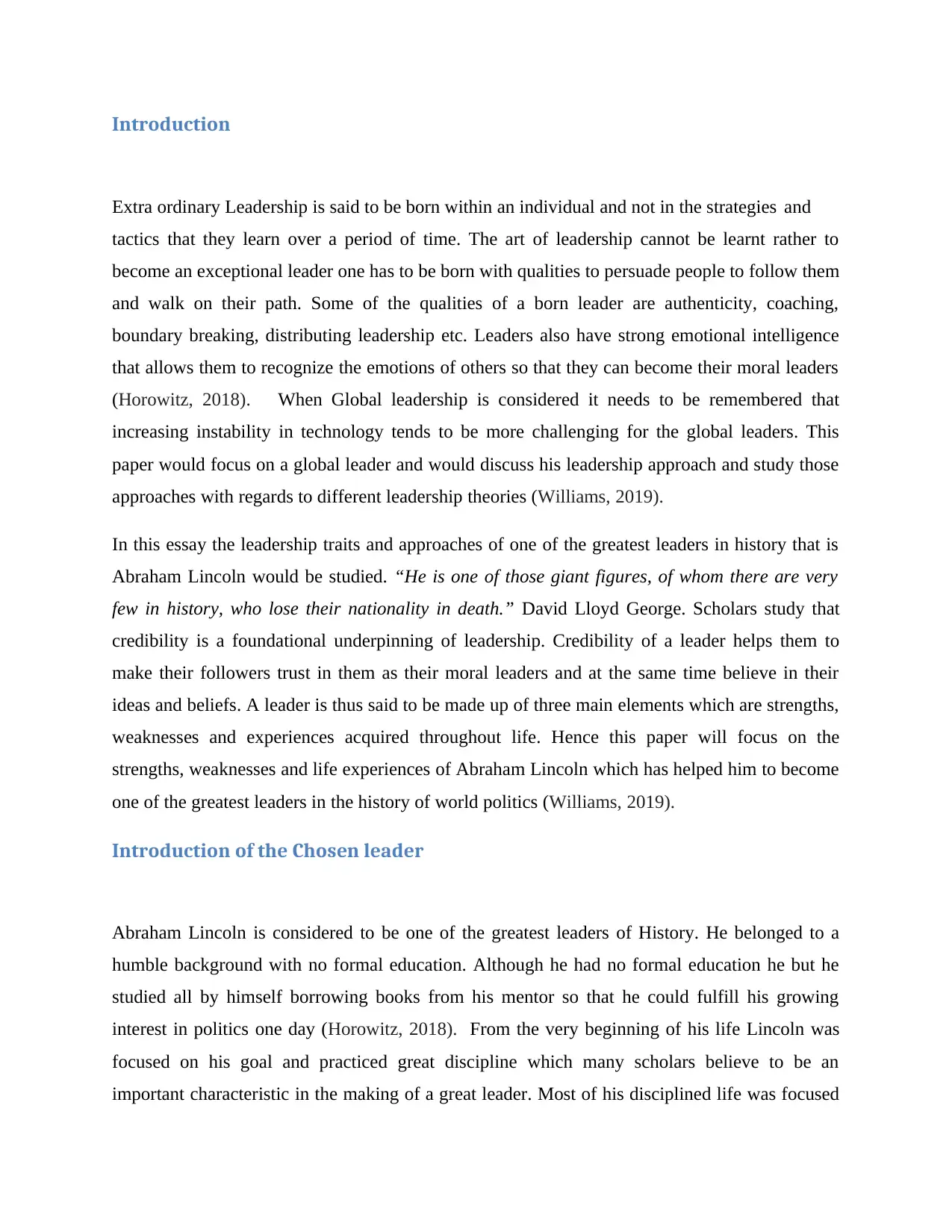
Introduction
Extra ordinary Leadership is said to be born within an individual and not in the strategies and
tactics that they learn over a period of time. The art of leadership cannot be learnt rather to
become an exceptional leader one has to be born with qualities to persuade people to follow them
and walk on their path. Some of the qualities of a born leader are authenticity, coaching,
boundary breaking, distributing leadership etc. Leaders also have strong emotional intelligence
that allows them to recognize the emotions of others so that they can become their moral leaders
(Horowitz, 2018). When Global leadership is considered it needs to be remembered that
increasing instability in technology tends to be more challenging for the global leaders. This
paper would focus on a global leader and would discuss his leadership approach and study those
approaches with regards to different leadership theories (Williams, 2019).
In this essay the leadership traits and approaches of one of the greatest leaders in history that is
Abraham Lincoln would be studied. “He is one of those giant figures, of whom there are very
few in history, who lose their nationality in death.” David Lloyd George. Scholars study that
credibility is a foundational underpinning of leadership. Credibility of a leader helps them to
make their followers trust in them as their moral leaders and at the same time believe in their
ideas and beliefs. A leader is thus said to be made up of three main elements which are strengths,
weaknesses and experiences acquired throughout life. Hence this paper will focus on the
strengths, weaknesses and life experiences of Abraham Lincoln which has helped him to become
one of the greatest leaders in the history of world politics (Williams, 2019).
Introduction of the Chosen leader
Abraham Lincoln is considered to be one of the greatest leaders of History. He belonged to a
humble background with no formal education. Although he had no formal education he but he
studied all by himself borrowing books from his mentor so that he could fulfill his growing
interest in politics one day (Horowitz, 2018). From the very beginning of his life Lincoln was
focused on his goal and practiced great discipline which many scholars believe to be an
important characteristic in the making of a great leader. Most of his disciplined life was focused
Extra ordinary Leadership is said to be born within an individual and not in the strategies and
tactics that they learn over a period of time. The art of leadership cannot be learnt rather to
become an exceptional leader one has to be born with qualities to persuade people to follow them
and walk on their path. Some of the qualities of a born leader are authenticity, coaching,
boundary breaking, distributing leadership etc. Leaders also have strong emotional intelligence
that allows them to recognize the emotions of others so that they can become their moral leaders
(Horowitz, 2018). When Global leadership is considered it needs to be remembered that
increasing instability in technology tends to be more challenging for the global leaders. This
paper would focus on a global leader and would discuss his leadership approach and study those
approaches with regards to different leadership theories (Williams, 2019).
In this essay the leadership traits and approaches of one of the greatest leaders in history that is
Abraham Lincoln would be studied. “He is one of those giant figures, of whom there are very
few in history, who lose their nationality in death.” David Lloyd George. Scholars study that
credibility is a foundational underpinning of leadership. Credibility of a leader helps them to
make their followers trust in them as their moral leaders and at the same time believe in their
ideas and beliefs. A leader is thus said to be made up of three main elements which are strengths,
weaknesses and experiences acquired throughout life. Hence this paper will focus on the
strengths, weaknesses and life experiences of Abraham Lincoln which has helped him to become
one of the greatest leaders in the history of world politics (Williams, 2019).
Introduction of the Chosen leader
Abraham Lincoln is considered to be one of the greatest leaders of History. He belonged to a
humble background with no formal education. Although he had no formal education he but he
studied all by himself borrowing books from his mentor so that he could fulfill his growing
interest in politics one day (Horowitz, 2018). From the very beginning of his life Lincoln was
focused on his goal and practiced great discipline which many scholars believe to be an
important characteristic in the making of a great leader. Most of his disciplined life was focused
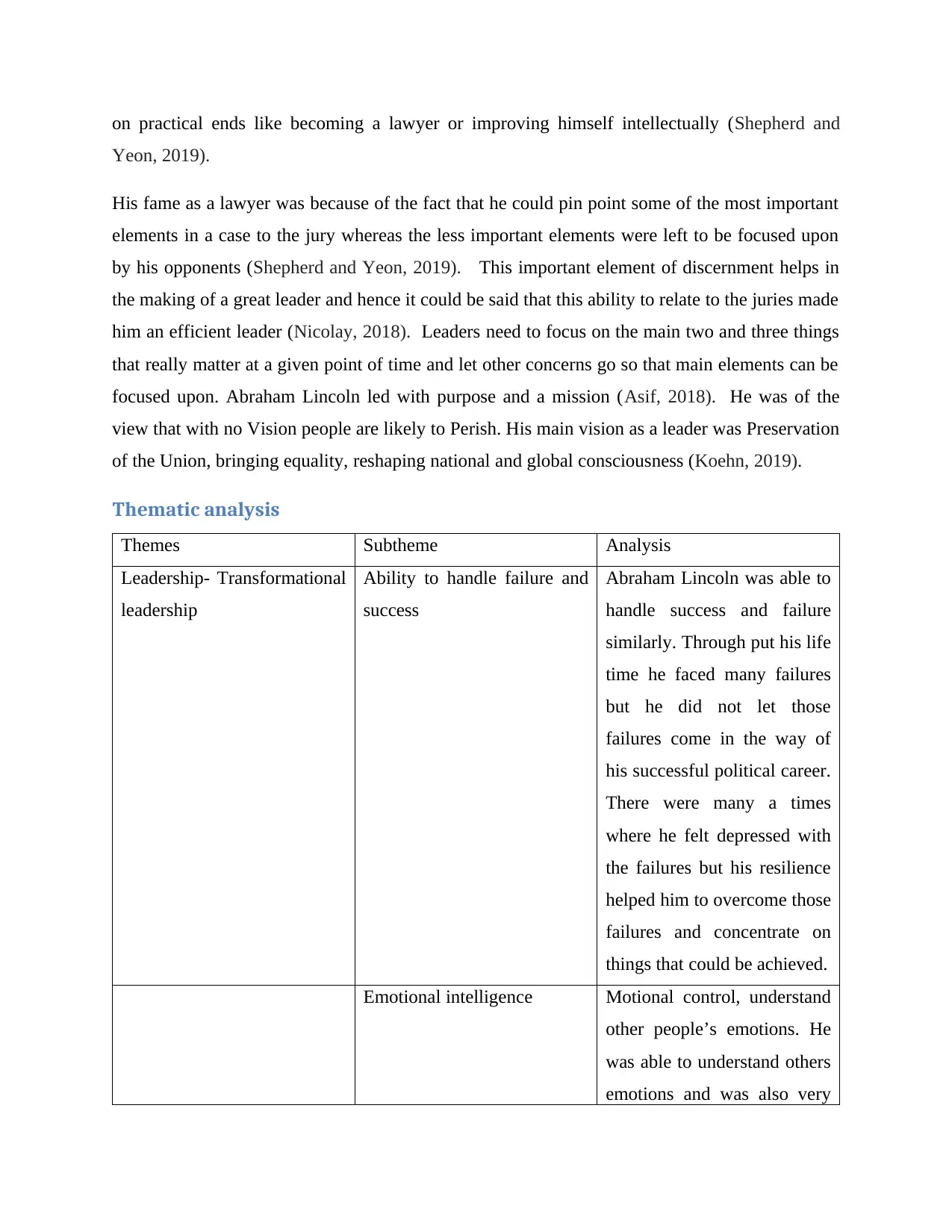
on practical ends like becoming a lawyer or improving himself intellectually (Shepherd and
Yeon, 2019).
His fame as a lawyer was because of the fact that he could pin point some of the most important
elements in a case to the jury whereas the less important elements were left to be focused upon
by his opponents (Shepherd and Yeon, 2019). This important element of discernment helps in
the making of a great leader and hence it could be said that this ability to relate to the juries made
him an efficient leader (Nicolay, 2018). Leaders need to focus on the main two and three things
that really matter at a given point of time and let other concerns go so that main elements can be
focused upon. Abraham Lincoln led with purpose and a mission (Asif, 2018). He was of the
view that with no Vision people are likely to Perish. His main vision as a leader was Preservation
of the Union, bringing equality, reshaping national and global consciousness (Koehn, 2019).
Thematic analysis
Themes Subtheme Analysis
Leadership- Transformational
leadership
Ability to handle failure and
success
Abraham Lincoln was able to
handle success and failure
similarly. Through put his life
time he faced many failures
but he did not let those
failures come in the way of
his successful political career.
There were many a times
where he felt depressed with
the failures but his resilience
helped him to overcome those
failures and concentrate on
things that could be achieved.
Emotional intelligence Motional control, understand
other people’s emotions. He
was able to understand others
emotions and was also very
Yeon, 2019).
His fame as a lawyer was because of the fact that he could pin point some of the most important
elements in a case to the jury whereas the less important elements were left to be focused upon
by his opponents (Shepherd and Yeon, 2019). This important element of discernment helps in
the making of a great leader and hence it could be said that this ability to relate to the juries made
him an efficient leader (Nicolay, 2018). Leaders need to focus on the main two and three things
that really matter at a given point of time and let other concerns go so that main elements can be
focused upon. Abraham Lincoln led with purpose and a mission (Asif, 2018). He was of the
view that with no Vision people are likely to Perish. His main vision as a leader was Preservation
of the Union, bringing equality, reshaping national and global consciousness (Koehn, 2019).
Thematic analysis
Themes Subtheme Analysis
Leadership- Transformational
leadership
Ability to handle failure and
success
Abraham Lincoln was able to
handle success and failure
similarly. Through put his life
time he faced many failures
but he did not let those
failures come in the way of
his successful political career.
There were many a times
where he felt depressed with
the failures but his resilience
helped him to overcome those
failures and concentrate on
things that could be achieved.
Emotional intelligence Motional control, understand
other people’s emotions. He
was able to understand others
emotions and was also very
⊘ This is a preview!⊘
Do you want full access?
Subscribe today to unlock all pages.

Trusted by 1+ million students worldwide
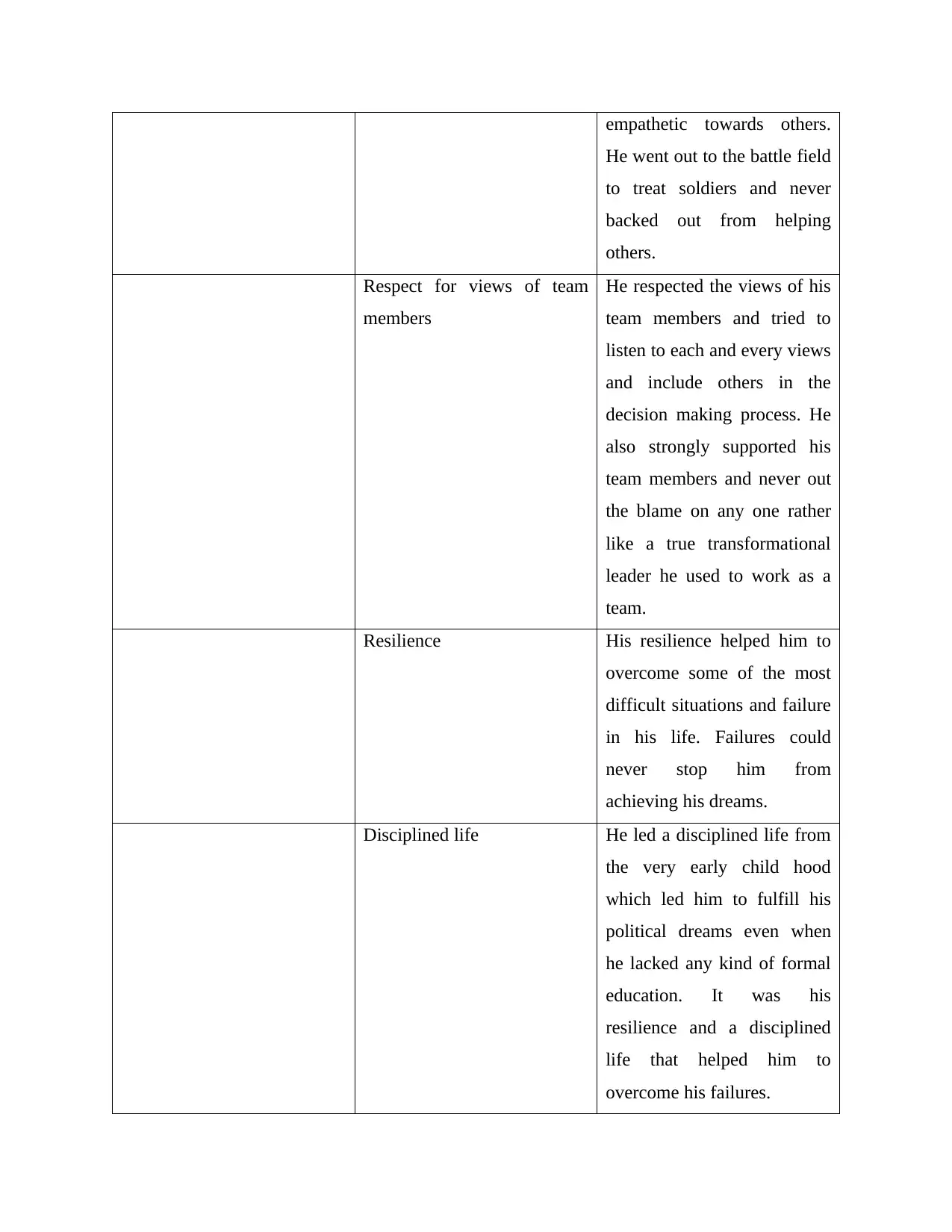
empathetic towards others.
He went out to the battle field
to treat soldiers and never
backed out from helping
others.
Respect for views of team
members
He respected the views of his
team members and tried to
listen to each and every views
and include others in the
decision making process. He
also strongly supported his
team members and never out
the blame on any one rather
like a true transformational
leader he used to work as a
team.
Resilience His resilience helped him to
overcome some of the most
difficult situations and failure
in his life. Failures could
never stop him from
achieving his dreams.
Disciplined life He led a disciplined life from
the very early child hood
which led him to fulfill his
political dreams even when
he lacked any kind of formal
education. It was his
resilience and a disciplined
life that helped him to
overcome his failures.
He went out to the battle field
to treat soldiers and never
backed out from helping
others.
Respect for views of team
members
He respected the views of his
team members and tried to
listen to each and every views
and include others in the
decision making process. He
also strongly supported his
team members and never out
the blame on any one rather
like a true transformational
leader he used to work as a
team.
Resilience His resilience helped him to
overcome some of the most
difficult situations and failure
in his life. Failures could
never stop him from
achieving his dreams.
Disciplined life He led a disciplined life from
the very early child hood
which led him to fulfill his
political dreams even when
he lacked any kind of formal
education. It was his
resilience and a disciplined
life that helped him to
overcome his failures.
Paraphrase This Document
Need a fresh take? Get an instant paraphrase of this document with our AI Paraphraser
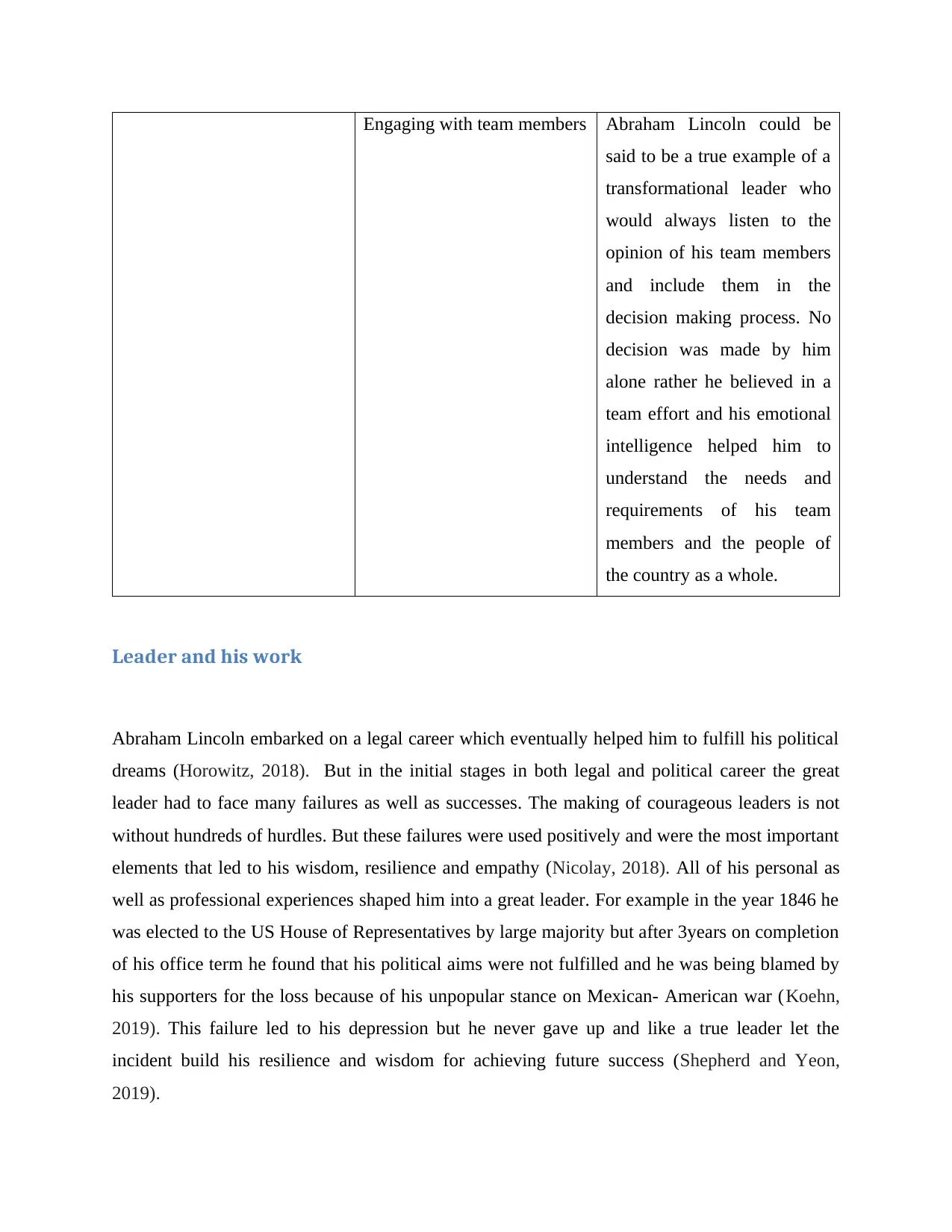
Engaging with team members Abraham Lincoln could be
said to be a true example of a
transformational leader who
would always listen to the
opinion of his team members
and include them in the
decision making process. No
decision was made by him
alone rather he believed in a
team effort and his emotional
intelligence helped him to
understand the needs and
requirements of his team
members and the people of
the country as a whole.
Leader and his work
Abraham Lincoln embarked on a legal career which eventually helped him to fulfill his political
dreams (Horowitz, 2018). But in the initial stages in both legal and political career the great
leader had to face many failures as well as successes. The making of courageous leaders is not
without hundreds of hurdles. But these failures were used positively and were the most important
elements that led to his wisdom, resilience and empathy (Nicolay, 2018). All of his personal as
well as professional experiences shaped him into a great leader. For example in the year 1846 he
was elected to the US House of Representatives by large majority but after 3years on completion
of his office term he found that his political aims were not fulfilled and he was being blamed by
his supporters for the loss because of his unpopular stance on Mexican- American war (Koehn,
2019). This failure led to his depression but he never gave up and like a true leader let the
incident build his resilience and wisdom for achieving future success (Shepherd and Yeon,
2019).
said to be a true example of a
transformational leader who
would always listen to the
opinion of his team members
and include them in the
decision making process. No
decision was made by him
alone rather he believed in a
team effort and his emotional
intelligence helped him to
understand the needs and
requirements of his team
members and the people of
the country as a whole.
Leader and his work
Abraham Lincoln embarked on a legal career which eventually helped him to fulfill his political
dreams (Horowitz, 2018). But in the initial stages in both legal and political career the great
leader had to face many failures as well as successes. The making of courageous leaders is not
without hundreds of hurdles. But these failures were used positively and were the most important
elements that led to his wisdom, resilience and empathy (Nicolay, 2018). All of his personal as
well as professional experiences shaped him into a great leader. For example in the year 1846 he
was elected to the US House of Representatives by large majority but after 3years on completion
of his office term he found that his political aims were not fulfilled and he was being blamed by
his supporters for the loss because of his unpopular stance on Mexican- American war (Koehn,
2019). This failure led to his depression but he never gave up and like a true leader let the
incident build his resilience and wisdom for achieving future success (Shepherd and Yeon,
2019).
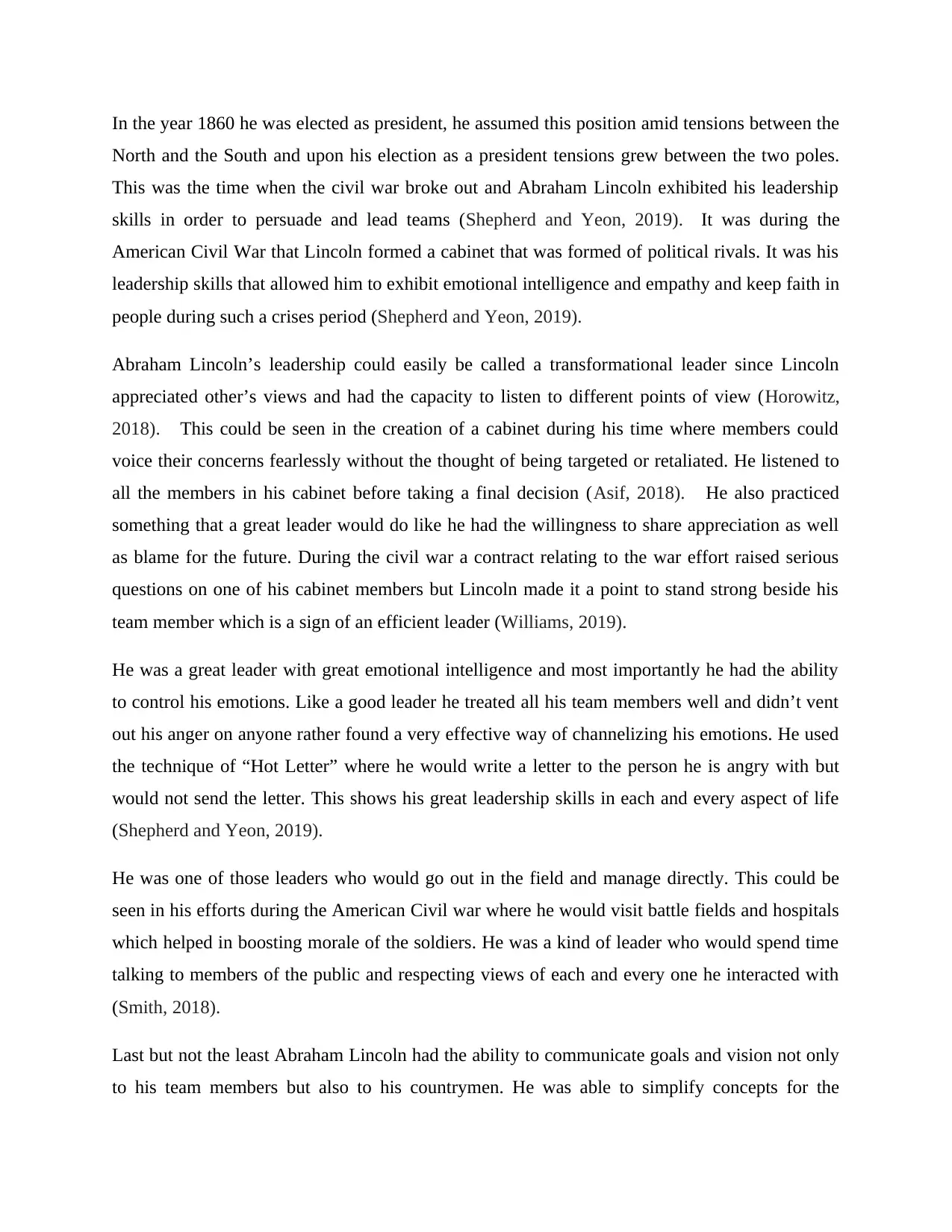
In the year 1860 he was elected as president, he assumed this position amid tensions between the
North and the South and upon his election as a president tensions grew between the two poles.
This was the time when the civil war broke out and Abraham Lincoln exhibited his leadership
skills in order to persuade and lead teams (Shepherd and Yeon, 2019). It was during the
American Civil War that Lincoln formed a cabinet that was formed of political rivals. It was his
leadership skills that allowed him to exhibit emotional intelligence and empathy and keep faith in
people during such a crises period (Shepherd and Yeon, 2019).
Abraham Lincoln’s leadership could easily be called a transformational leader since Lincoln
appreciated other’s views and had the capacity to listen to different points of view (Horowitz,
2018). This could be seen in the creation of a cabinet during his time where members could
voice their concerns fearlessly without the thought of being targeted or retaliated. He listened to
all the members in his cabinet before taking a final decision (Asif, 2018). He also practiced
something that a great leader would do like he had the willingness to share appreciation as well
as blame for the future. During the civil war a contract relating to the war effort raised serious
questions on one of his cabinet members but Lincoln made it a point to stand strong beside his
team member which is a sign of an efficient leader (Williams, 2019).
He was a great leader with great emotional intelligence and most importantly he had the ability
to control his emotions. Like a good leader he treated all his team members well and didn’t vent
out his anger on anyone rather found a very effective way of channelizing his emotions. He used
the technique of “Hot Letter” where he would write a letter to the person he is angry with but
would not send the letter. This shows his great leadership skills in each and every aspect of life
(Shepherd and Yeon, 2019).
He was one of those leaders who would go out in the field and manage directly. This could be
seen in his efforts during the American Civil war where he would visit battle fields and hospitals
which helped in boosting morale of the soldiers. He was a kind of leader who would spend time
talking to members of the public and respecting views of each and every one he interacted with
(Smith, 2018).
Last but not the least Abraham Lincoln had the ability to communicate goals and vision not only
to his team members but also to his countrymen. He was able to simplify concepts for the
North and the South and upon his election as a president tensions grew between the two poles.
This was the time when the civil war broke out and Abraham Lincoln exhibited his leadership
skills in order to persuade and lead teams (Shepherd and Yeon, 2019). It was during the
American Civil War that Lincoln formed a cabinet that was formed of political rivals. It was his
leadership skills that allowed him to exhibit emotional intelligence and empathy and keep faith in
people during such a crises period (Shepherd and Yeon, 2019).
Abraham Lincoln’s leadership could easily be called a transformational leader since Lincoln
appreciated other’s views and had the capacity to listen to different points of view (Horowitz,
2018). This could be seen in the creation of a cabinet during his time where members could
voice their concerns fearlessly without the thought of being targeted or retaliated. He listened to
all the members in his cabinet before taking a final decision (Asif, 2018). He also practiced
something that a great leader would do like he had the willingness to share appreciation as well
as blame for the future. During the civil war a contract relating to the war effort raised serious
questions on one of his cabinet members but Lincoln made it a point to stand strong beside his
team member which is a sign of an efficient leader (Williams, 2019).
He was a great leader with great emotional intelligence and most importantly he had the ability
to control his emotions. Like a good leader he treated all his team members well and didn’t vent
out his anger on anyone rather found a very effective way of channelizing his emotions. He used
the technique of “Hot Letter” where he would write a letter to the person he is angry with but
would not send the letter. This shows his great leadership skills in each and every aspect of life
(Shepherd and Yeon, 2019).
He was one of those leaders who would go out in the field and manage directly. This could be
seen in his efforts during the American Civil war where he would visit battle fields and hospitals
which helped in boosting morale of the soldiers. He was a kind of leader who would spend time
talking to members of the public and respecting views of each and every one he interacted with
(Smith, 2018).
Last but not the least Abraham Lincoln had the ability to communicate goals and vision not only
to his team members but also to his countrymen. He was able to simplify concepts for the
⊘ This is a preview!⊘
Do you want full access?
Subscribe today to unlock all pages.

Trusted by 1+ million students worldwide
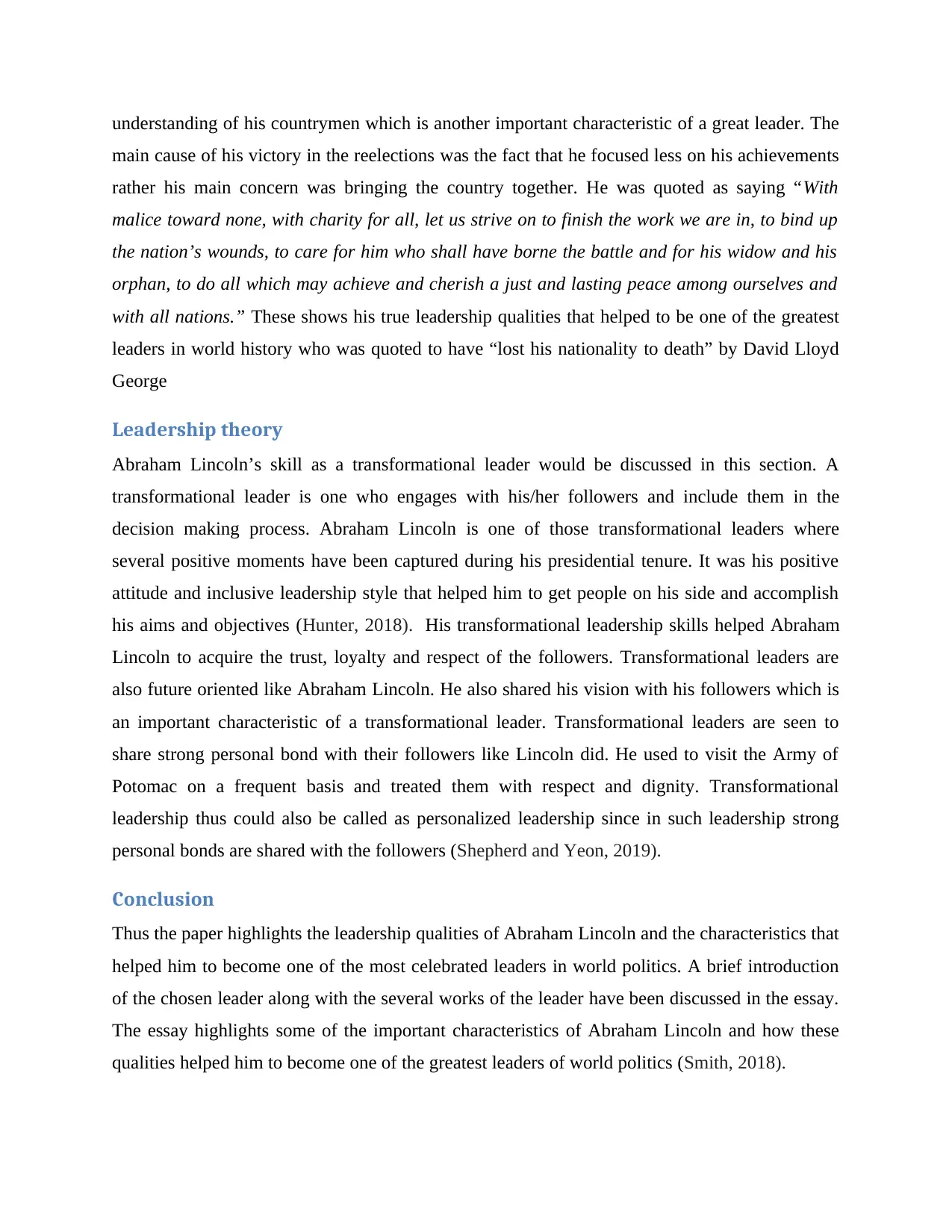
understanding of his countrymen which is another important characteristic of a great leader. The
main cause of his victory in the reelections was the fact that he focused less on his achievements
rather his main concern was bringing the country together. He was quoted as saying “With
malice toward none, with charity for all, let us strive on to finish the work we are in, to bind up
the nation’s wounds, to care for him who shall have borne the battle and for his widow and his
orphan, to do all which may achieve and cherish a just and lasting peace among ourselves and
with all nations.” These shows his true leadership qualities that helped to be one of the greatest
leaders in world history who was quoted to have “lost his nationality to death” by David Lloyd
George
Leadership theory
Abraham Lincoln’s skill as a transformational leader would be discussed in this section. A
transformational leader is one who engages with his/her followers and include them in the
decision making process. Abraham Lincoln is one of those transformational leaders where
several positive moments have been captured during his presidential tenure. It was his positive
attitude and inclusive leadership style that helped him to get people on his side and accomplish
his aims and objectives (Hunter, 2018). His transformational leadership skills helped Abraham
Lincoln to acquire the trust, loyalty and respect of the followers. Transformational leaders are
also future oriented like Abraham Lincoln. He also shared his vision with his followers which is
an important characteristic of a transformational leader. Transformational leaders are seen to
share strong personal bond with their followers like Lincoln did. He used to visit the Army of
Potomac on a frequent basis and treated them with respect and dignity. Transformational
leadership thus could also be called as personalized leadership since in such leadership strong
personal bonds are shared with the followers (Shepherd and Yeon, 2019).
Conclusion
Thus the paper highlights the leadership qualities of Abraham Lincoln and the characteristics that
helped him to become one of the most celebrated leaders in world politics. A brief introduction
of the chosen leader along with the several works of the leader have been discussed in the essay.
The essay highlights some of the important characteristics of Abraham Lincoln and how these
qualities helped him to become one of the greatest leaders of world politics (Smith, 2018).
main cause of his victory in the reelections was the fact that he focused less on his achievements
rather his main concern was bringing the country together. He was quoted as saying “With
malice toward none, with charity for all, let us strive on to finish the work we are in, to bind up
the nation’s wounds, to care for him who shall have borne the battle and for his widow and his
orphan, to do all which may achieve and cherish a just and lasting peace among ourselves and
with all nations.” These shows his true leadership qualities that helped to be one of the greatest
leaders in world history who was quoted to have “lost his nationality to death” by David Lloyd
George
Leadership theory
Abraham Lincoln’s skill as a transformational leader would be discussed in this section. A
transformational leader is one who engages with his/her followers and include them in the
decision making process. Abraham Lincoln is one of those transformational leaders where
several positive moments have been captured during his presidential tenure. It was his positive
attitude and inclusive leadership style that helped him to get people on his side and accomplish
his aims and objectives (Hunter, 2018). His transformational leadership skills helped Abraham
Lincoln to acquire the trust, loyalty and respect of the followers. Transformational leaders are
also future oriented like Abraham Lincoln. He also shared his vision with his followers which is
an important characteristic of a transformational leader. Transformational leaders are seen to
share strong personal bond with their followers like Lincoln did. He used to visit the Army of
Potomac on a frequent basis and treated them with respect and dignity. Transformational
leadership thus could also be called as personalized leadership since in such leadership strong
personal bonds are shared with the followers (Shepherd and Yeon, 2019).
Conclusion
Thus the paper highlights the leadership qualities of Abraham Lincoln and the characteristics that
helped him to become one of the most celebrated leaders in world politics. A brief introduction
of the chosen leader along with the several works of the leader have been discussed in the essay.
The essay highlights some of the important characteristics of Abraham Lincoln and how these
qualities helped him to become one of the greatest leaders of world politics (Smith, 2018).
Paraphrase This Document
Need a fresh take? Get an instant paraphrase of this document with our AI Paraphraser
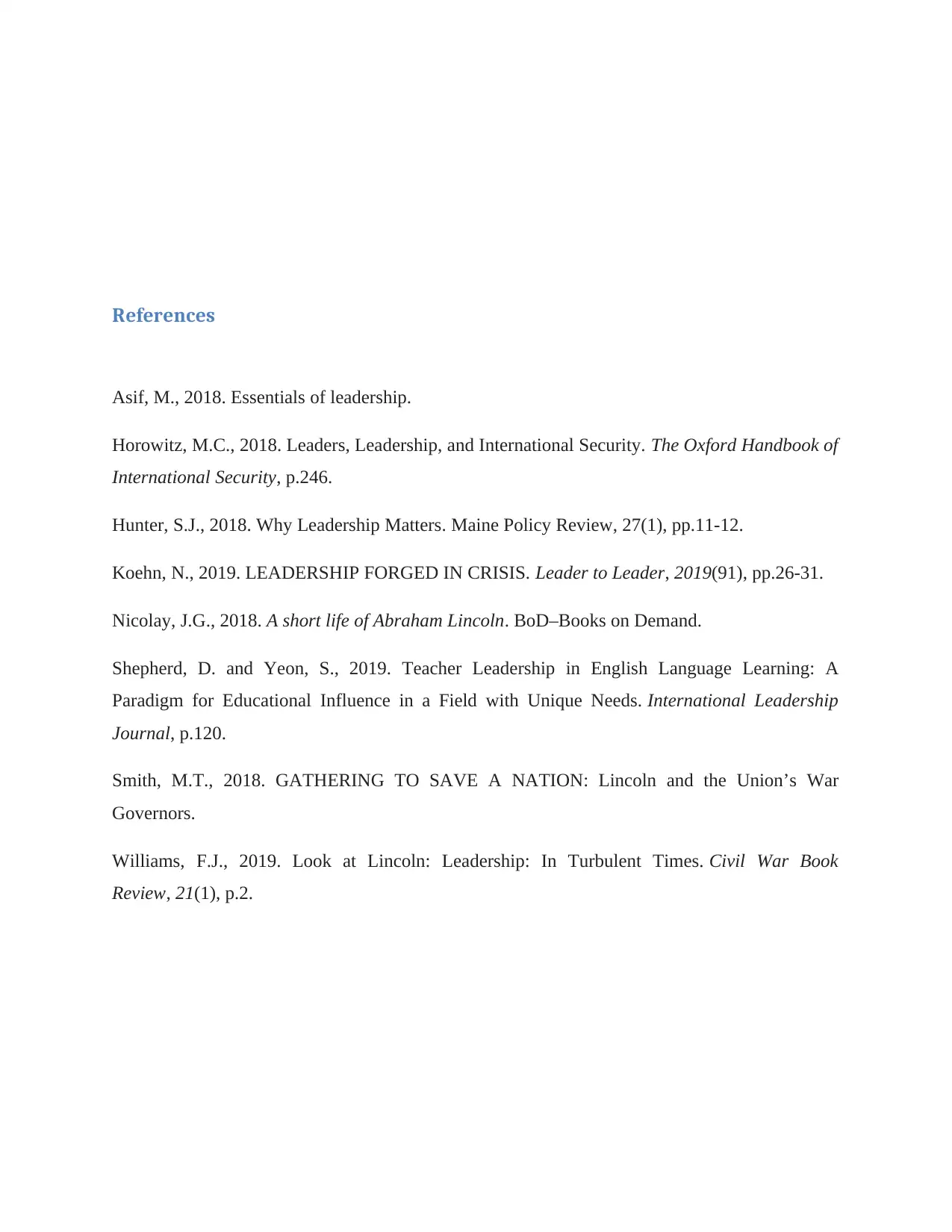
References
Asif, M., 2018. Essentials of leadership.
Horowitz, M.C., 2018. Leaders, Leadership, and International Security. The Oxford Handbook of
International Security, p.246.
Hunter, S.J., 2018. Why Leadership Matters. Maine Policy Review, 27(1), pp.11-12.
Koehn, N., 2019. LEADERSHIP FORGED IN CRISIS. Leader to Leader, 2019(91), pp.26-31.
Nicolay, J.G., 2018. A short life of Abraham Lincoln. BoD–Books on Demand.
Shepherd, D. and Yeon, S., 2019. Teacher Leadership in English Language Learning: A
Paradigm for Educational Influence in a Field with Unique Needs. International Leadership
Journal, p.120.
Smith, M.T., 2018. GATHERING TO SAVE A NATION: Lincoln and the Union’s War
Governors.
Williams, F.J., 2019. Look at Lincoln: Leadership: In Turbulent Times. Civil War Book
Review, 21(1), p.2.
Asif, M., 2018. Essentials of leadership.
Horowitz, M.C., 2018. Leaders, Leadership, and International Security. The Oxford Handbook of
International Security, p.246.
Hunter, S.J., 2018. Why Leadership Matters. Maine Policy Review, 27(1), pp.11-12.
Koehn, N., 2019. LEADERSHIP FORGED IN CRISIS. Leader to Leader, 2019(91), pp.26-31.
Nicolay, J.G., 2018. A short life of Abraham Lincoln. BoD–Books on Demand.
Shepherd, D. and Yeon, S., 2019. Teacher Leadership in English Language Learning: A
Paradigm for Educational Influence in a Field with Unique Needs. International Leadership
Journal, p.120.
Smith, M.T., 2018. GATHERING TO SAVE A NATION: Lincoln and the Union’s War
Governors.
Williams, F.J., 2019. Look at Lincoln: Leadership: In Turbulent Times. Civil War Book
Review, 21(1), p.2.
1 out of 8
Related Documents
Your All-in-One AI-Powered Toolkit for Academic Success.
+13062052269
info@desklib.com
Available 24*7 on WhatsApp / Email
![[object Object]](/_next/static/media/star-bottom.7253800d.svg)
Unlock your academic potential
Copyright © 2020–2026 A2Z Services. All Rights Reserved. Developed and managed by ZUCOL.



